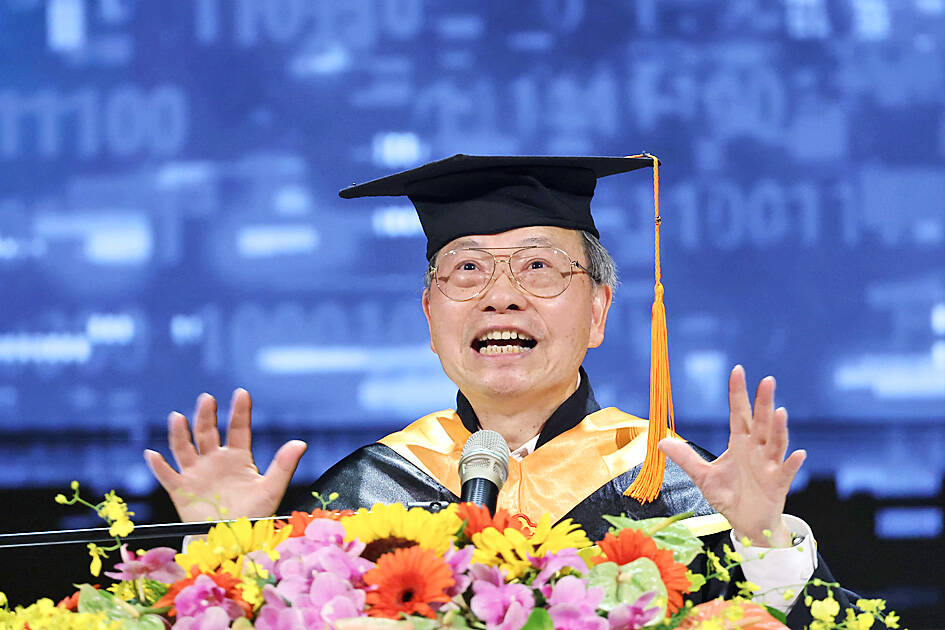US-based high-performance server maker Super Micro Computer Inc is planning to expand its presence in Taiwan and forge closer ties with the local industrial sector, Super Micro founder and CEO Charles Liang (梁見後) said on Saturday.
Expanding in Taiwan has become an operational priority for the company, he told reporters on the sidelines of a graduation ceremony at the National Taipei University of Technology (Taipei Tech), formerly known as the National Taipei Institute of Technology, from which Liang graduated in 1978.
Liang, a Taiwanese-American originally from Chiayi County, who received an honorary doctorate from Taipei Tech in 2011, founded Super Micro in Silicon Valley in 1993. The company went public on the NASDAQ in 2007.

Photo: CNA
Liang said Super Micro has built a science and technology park in Taoyuan’s Bade District (八德) and is planning to build another production site in Taiwan.
The new investment is expected to be announced in the next few months.
“It is not only in the United States, Super Micro is also expanding in Taiwan, Malaysia and Europe,” Liang said, “Taiwan is our top choice for investment as long as the timing is right.”
“Super Micro has enjoyed good growth, and that is expected to continue, so expanding our operations in Taiwan is a natural step,” Liang said.
At the end of 2019, the company announced an investment of about NT$20 billion (US$616.9 million) to build a science and technology park in Taoyuan to accommodate a research and development center, a software development center, a warehousing and logistics hub, and automated production lines.
Liang is in Taipei to attend Computex Taipei, one of the largest information technology (IT) exhibitions in the world, which starts tomorrow. On Wednesday, he is to deliver a keynote speech about Super Micro’s artificial intelligence (AI) infrastructure advancements, opportunities in the industry and strategies for deploying sustainable total IT solutions.
Liang said that he would meet Nvidia Corp CEO Jensen Huang (黃仁勳) during his stay in Taiwan, adding that he expects Nvidia to continue prospering in AI development.
In his graduation ceremony speech, Liang said that Super Micro had intensified efforts to surpass its peers and worked closely with its Taiwanese partners to bolster global competitiveness.
He remains upbeat about liquid cooling technology during the AI boom and would work with suppliers to obtain a 20 to 30 percent share of the global market next year, he said.
Liang said he donated 10 AI servers to Taipei Tech in the hopes that they would expand the school’s high-performance computing capabilities, cultivate an AI talent pool and boost research and development.

‘SWASTICAR’: Tesla CEO Elon Musk’s close association with Donald Trump has prompted opponents to brand him a ‘Nazi’ and resulted in a dramatic drop in sales Demonstrators descended on Tesla Inc dealerships across the US, and in Europe and Canada on Saturday to protest company chief Elon Musk, who has amassed extraordinary power as a top adviser to US President Donald Trump. Waving signs with messages such as “Musk is stealing our money” and “Reclaim our country,” the protests largely took place peacefully following fiery episodes of vandalism on Tesla vehicles, dealerships and other facilities in recent weeks that US officials have denounced as terrorism. Hundreds rallied on Saturday outside the Tesla dealership in Manhattan. Some blasted Musk, the world’s richest man, while others demanded the shuttering of his

ADVERSARIES: The new list includes 11 entities in China and one in Taiwan, which is a local branch of Chinese cloud computing firm Inspur Group The US added dozens of entities to a trade blacklist on Tuesday, the US Department of Commerce said, in part to disrupt Beijing’s artificial intelligence (AI) and advanced computing capabilities. The action affects 80 entities from countries including China, the United Arab Emirates and Iran, with the commerce department citing their “activities contrary to US national security and foreign policy.” Those added to the “entity list” are restricted from obtaining US items and technologies without government authorization. “We will not allow adversaries to exploit American technology to bolster their own militaries and threaten American lives,” US Secretary of Commerce Howard Lutnick said. The entities

Minister of Finance Chuang Tsui-yun (莊翠雲) yesterday told lawmakers that she “would not speculate,” but a “response plan” has been prepared in case Taiwan is targeted by US President Donald Trump’s reciprocal tariffs, which are to be announced on Wednesday next week. The Trump administration, including US Secretary of the Treasury Scott Bessent, has said that much of the proposed reciprocal tariffs would focus on the 15 countries that have the highest trade surpluses with the US. Bessent has referred to those countries as the “dirty 15,” but has not named them. Last year, Taiwan’s US$73.9 billion trade surplus with the US

Prices of gasoline and diesel products at domestic gas stations are to fall NT$0.2 and NT$0.1 per liter respectively this week, even though international crude oil prices rose last week, CPC Corp, Taiwan (台灣中油) and Formosa Petrochemical Corp (台塑石化) said yesterday. International crude oil prices continued rising last week, as the US Energy Information Administration reported a larger-than-expected drop in US commercial crude oil inventories, CPC said in a statement. Based on the company’s floating oil price formula, the cost of crude oil rose 2.38 percent last week from a week earlier, it said. News that US President Donald Trump plans a “secondary